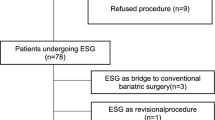Abstract
Background and Aims
Endoscopic sleeve gastroplasty (ESG) has demonstrated promising weight loss results with fewer adverse events and less new-onset gastroesophageal reflux disease (GERD) compared to laparoscopic sleeve gastrectomy. Publications on ESG have exclusively described the experience at large academic medical centers with little known about the implementation and outcomes of this procedure in community practice.
Methods
We conducted a retrospective study of consecutive patients who underwent ESG at a private, community-based gastroenterology practice. Total body weight loss (TBWL), procedure duration, improvement in metabolic comorbidities, and adverse event (AE) rate and severity were assessed.
Results
One hundred patients underwent ESG (86 women, mean age 45 ± 9 years) and were analyzed. Procedure duration was 59 ± 33 min with an improvement in procedural efficiency from the first quartile (mean 105 min) to the fourth quartile (mean 38 min). Mean 12-month TBWL was 29.80 ± 11.46 kg (23.1 ± 7.5%), with excess weight loss of 66.1 ± 21.5%. Over this time period, mean change in BMI was 9.43 ± 0.22. A multiple linear regression model found that higher starting weight (P < 0.05) and absence of suture reinforcement (P = 0.037) were associated with increased TBWL at 3 months. Fourteen of 20 cases of hypertension, and 5 of 10 cases of dyslipidemia, were in complete remission by post-procedure month 3.
Conclusions
ESG performed in a community gastroenterology practice demonstrated comparable clinical outcomes to large tertiary referral centers. TBWL and excess body weight loss either met or exceeded previously reported data from these centers.



Similar content being viewed by others
Abbreviations
- ESG:
-
Endoscopic sleeve gastroplasty
References
Arterburn DE, Courcoulas AP. Bariatric surgery for obesity and metabolic conditions in adults. Bmj. 2014;349:g3961.
Westerveld D, Yang D. Through thick and thin: identifying barriers to bariatric surgery, weight loss maintenance, and tailoring obesity treatment for the future. Surg Res Pract. 2016;2016
Yermilov I, McGory ML, Shekelle PW, et al. Appropriateness criteria for bariatric surgery: beyond the NIH guidelines. Obesity. 2009;17(8):1521–7.
Force AB. ASGE Bariatric Endoscopy Task Force systematic review and meta-analysis assessing the ASGE PIVI thresholds for adopting endoscopic bariatric therapies. Gastrointest Endosc. 2015;82(3):425–38.
Dayyeh BK, Rajan E, Gostout CJ. Endoscopic sleeve gastroplasty: a potential endoscopic alternative to surgical sleeve gastrectomy for treatment of obesity. Gastrointest Endosc. 2013;78(3):530–5.
Fayad L, Adam A, Schweitzer M, et al. Endoscopic sleeve gastroplasty versus laparoscopic sleeve gastrectomy: a case-matched study. Gastrointest Endosc. 2019;89(4):782–8.
James TW, McGowan CE. The descending gastric fundus in endoscopic sleeve gastroplasty: implications for procedural technique and adverse events. VideoGIE. 2019;4(6):254.
Telem DA, Dimick JB. Practical guide to surgical data sets: Metabolic and Bariatric Surgery Accreditation and Quality Program (MBSAQIP). JAMA Surgery. 2018;153(8):766–7.
Mechanick JI, Youdim A, Jones DB, et al. Clinical practice guidelines for the perioperative nutritional, metabolic, and nonsurgical support of the bariatric surgery patient—2013 update: cosponsored by American Association of Clinical Endocrinologists, the Obesity Society, and American Society for Metabolic & Bariatric Surgery. Obesity. 2013;21(S1):S1–27.
Cotton PB, Eisen GM, Aabakken L, et al. A lexicon for endoscopic adverse events: report of an ASGE workshop. Gastrointest Endosc. 2010;71(3):446–54.
Flegal KM, Carroll MD, Ogden CL, et al. Prevalence and trends in obesity among US adults, 1999–2008. Jama. 2010;303(3):235–41.
Bellentani S, Marino M. Epidemiology and natural history of non-alcoholic liver disease (NAFLD). Ann Hepatol. 2009;8(S1):4–8.
Yanovski SZ, Yanovski JA. Long-term drug treatment for obesity: a systematic and clinical review. Jama. 2014;311(1):74–86.
Buchwald H, Estok R, Fahrbach K, et al. Weight and type 2 diabetes after bariatric surgery: systematic review and meta-analysis. Am J Med. 2009;122(3):248–56.
Saumoy M, Schneider Y, Zhou XK, et al. A single-operator learning curve analysis for the endoscopic sleeve gastroplasty. Gastrointest Endosc. 2018;87(2):442–7.
Lee CM, Cirangle PT, Jossart GH. Vertical gastrectomy for morbid obesity in 216 patients: report of two-year results. Surg Endosc. 2007;21(10):1810–6.
Chang SH, Freeman NL, Lee JA, et al. Early major complications after bariatric surgery in the USA, 2003–2014: a systematic review and meta-analysis. Obes Rev. 2018;19(4):529–37.
Surve A, Cottam D, Medlin W, et al. A video case report of gastric perforation following endoscopic sleeve gastroplasty and its surgical treatment. Obes Surg. 2019;2:1–2.
Funding
Dr. James receives research and training support by a grant from the NIH (T32DK007634).
Author information
Authors and Affiliations
Corresponding author
Ethics declarations
Conflict of Interest
Dr. McGowan is a consultant for Apollo Endosurgery.
Statement of Informed Consent
Informed consent was obtained from all individual participants included in the study.
Statement of Human and Animal Rights/Ethical Approval
This is a retrospective chart review study and as such was exempt from institutional review board approval.
Additional information
Publisher’s Note
Springer Nature remains neutral with regard to jurisdictional claims in published maps and institutional affiliations.
Rights and permissions
About this article
Cite this article
James, T.W., Reddy, S., Vulpis, T. et al. Endoscopic Sleeve Gastroplasty Is Feasible, Safe, and Effective in a Non-academic Setting: Short-Term Outcomes from a Community Gastroenterology Practice. OBES SURG 30, 1404–1409 (2020). https://doi.org/10.1007/s11695-019-04331-3
Published:
Issue Date:
DOI: https://doi.org/10.1007/s11695-019-04331-3




